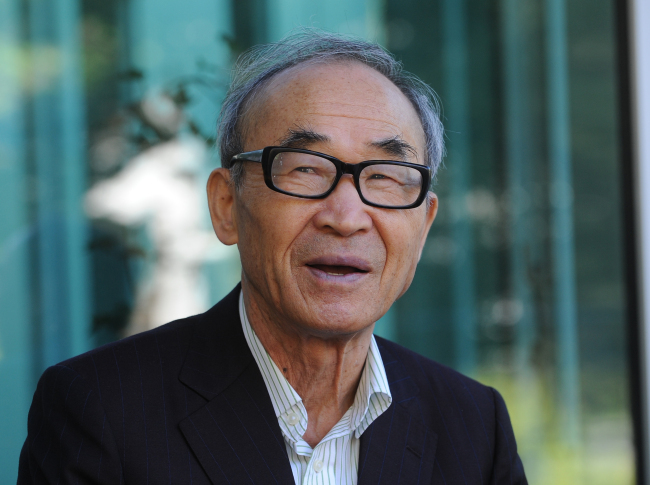When it started out as a simple reading club, Barry Welsh had no idea that his book club would become a forum for Korea’s most famous authors.
But 3 1/2 years since it started out, the Seoul Book Club has hosted not only expat writers but literary luminaries including Kim Yong-ha, Hwang Sok-yong and Gong Ji-young.
The book club meets again on Saturday, this time for a discussion with Ko Un, one of Korea’s best-known poets and an occasional tip for the Nobel Prize in literature.
He will be discussing his work with Brother Anthony, a longtime Korea resident who has translated many of Ko’s poems.
“He is so full of life and energy,” Welsh said of Ko. “He’s an amazing figure.”
“To have him onstage with his most well-known translator for a poetry reading and conversation … it’s an honor, really.”
The book club started out as a regular gathering of readers, set up by Welsh when he was unable to find one in Seoul that he was happy with.
But he said the club had not really managed to establish itself with a regular membership, and he was considering ending it until he managed to persuade Korean-American author Krys Lee to talk about her work at the club.
Welsh said he had been in touch with Lee before, and he had really enjoyed the book she had just written.
The event with Lee was the book club’s most popular meeting, so Welsh arranged a similar meeting with Shin Dong-hyuk, whose story ― the subject of recent controversy ― was the source material for Blaine Harden’s “Escape from Camp 14.”
“The response was crazy. So many people were interested,” he said.
 |
Poet Ko Un will be the guest at the Seoul Book Club at the Haechi Hall in Myeong-dong, Seoul, Saturday. (The Korea Herald) |
He booked a larger venue, but still had to turn people away as the room was full.
“It was then that it crystallized what the book club could be and what role it could play,” he said.
He began inviting expat authors to talk about their work, but then drew up a “greatest hits” list of Korean authors with work in English ― nearly all of whom have attended the club.
“I just think there was a space for it,” said Welsh. “It really fills a gap that wasn’t being provided for and a lot of people were really eager to meet these fascinating characters who have written these incredible books which engage with Korean history and culture in all sorts of different ways.”
He credits Lee with netting the first guest on his wish-list, Kim Yong-ha. Lee also agreed to interview Kim for the event, before opening up to audience questions.
Welsh has tried to arrange things so that interviewers work in the same field or translate literature.
“I think that leads to a much richer conversation,” he said.
“(Translators) have worked so closely with them that I think it’s much better to get someone like that doing the interview.”
He said he had gotten nearly everyone on his wish list, but one writer he would still love to have was Yi Mun-yol.
“He’s a world-class writer. Some of his short stories are really incredible and he has a lot of stuff in English,” said Welsh.
Welsh also said he was hoping to get other guests to do talks, such as movie directors or political figures such as Rep. Ahn Cheol-soo or Seoul Mayor Park Won-soon.
He admits he doesn’t know if it’s possible, but points out such events happen in his home country.
“In London you can meet (filmmaker) Mike Leigh,” he said. “These events happen elsewhere, so why not here?”
Ko Un will be the guest at Seoul Book Club at 2 p.m. at Haechi Hall, Myeong-dong, Saturday.
The following week, the club will welcome Suki Kim, author of “The Interpreter” and “Without You, There is no Us,” at 4 p.m at the W Stage in the WCO Culture Center, near City Hall Station.
By Paul Kerry (
paulkerry@heraldcorp.com)








